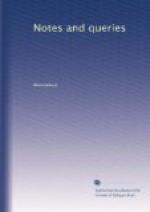“This citie [Bruges] hath an eminent market in place with a publicke house for the meeting of all marchants, at noone and evening: which house was called the Burse, of the houses of the extinct families Bursa, bearing three purses for their armes, ingraven upon their houses, from whence these meeting places to this day are called Burses in many countries, which in London wee know by the name of the Royall Exchange and of Britaines Burse.”
BOLTON CORNEY.
I think it probably that the expression “Flemish Account” may have been derived from the fact that the Flemish ell measures only three quarters of our yard, while the English ell measures five quarters, and that thence the epithet Flemish was adopted as denoting something deficient.
Q.Q.
When commerce was young, the Flemings were the great merchants of Western Europe; but these worthies were notorious, when furnishing their accounts current, for always having the balance at the right side (for themselves), and hence arose the term. I am not at this moment able to say where this information is to be had, but have met it somewhere.
JUNIOR.
I wonder that some better scholar than myself should not have explained the phrase “Flemish account;” but though I cannot quote authority for the precise expression, I may show whence it is derived. To flem, in old Scotch (and in old English too, I believe), is to “run away;” in modern slang, to “make oneself scarce,” “to levant.” Flemen is an outcast, an outlaw. It is easy to understand the application of the word to accounts. Your querist should consult some of the old dictionaries.
SCOTUS.
There is an old story that a Count of Flanders once gave an entertainment to some Flemish merchants, but that the seats on which they sat were without cushions. These “princes of the earth” thereupon folded up their costly velvet cloaks, and used them accordingly. When reminded, on their departure, of having left their cloaks behind, they replied, that when asked to a feast they were not in the habit of carrying away with them the chair cushions. Could this have originated the expression “Flemish account?” In this case the proud merchants gave such an account of a valuable article in their possession, as made it out to be quite worthless to the owner.
MUSAFIR.
* * * * *
ANSWERS TO MINOR QUERIES.
Richard Greene, Apothecary.
Mr. Richard Green, the subject of H.T.E.’s Query (No. 3. p. 43.), was an apothecary at Lichfield, and related to Dr. Johnson. He had a considerable collection of antiquities, &c., called “Green’s Museum,” which was sold, after his death, for a thousand pounds. See Boswell’s Johnson, Croker’s edition, vol. v. p. 194.




